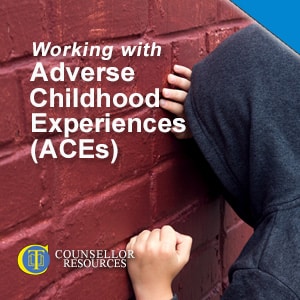Adverse Childhood Experiences are things that can happen in children's lives that may impact upon their future experiences.
Within this lecture, you will explore:
- Adverse Childhood Experiences and the life long consequences of trauma.
- Interventions that may be used to support those with ACEs.
- How Adverse Childhood Experiences and counselling fit together.
- ACE scoring.

Underpinning Theory of Adverse Childhood Experiences
The Center for Disease Control and Prevention (CDC) in the USA examined patterns of illness. In 1985, medical doctor Vincent Felitte was running an obesity clinic in Santiago, California. He was perplexed that almost 50% of his patients dropped out each year. In seeking to understand why this happened, he launched a 25-year research study involving more than 7,000 members of Kaiser Permanente, a provider of health insurance and medical care. Adverse childhood experiences were explored here.
Watch this Lecture + Access Hundreds of Hours of CPD
Certified CPD for Qualified Counsellors
- Hundreds of hours of on-demand CPD lectures to help you stay current with your CPD ethical requirements
- Support, and be supported, by thousands of other counsellors as a member of the exclusive online community.
- Access your learning anytime you want ... anywhere you choose ... using any device type — desktop or mobile.

Physiological and Psychological Impact of Adverse Childhood Experiences
Felitte discovered that people traumatised by ACEs often seek external sources to 'numb' their emotional pain. He went on to observe that these external sources can have negative impacts upon their lives and can even lead to premature death.
There are three broad categories of Adverse Childhood Experiences:
- Physical, emotional and sexual abuse
- Neglect
- Household dysfunction
The ACE score is a tally of different types of abuse, neglect and other hallmarks of a difficult or dysfunctional childhood. A client’s ACE score can inform assessment. It is vital to be properly trained first in how to use this in order to provide further ACE interventions.
According to ACE studies, the more challenging the person’s childhood, the higher their ACE score will be. This can be an indication that they could have a higher risk of health and wellbeing issues in later life. Common issues of this type include, but are not limited to:
- Drug misuse
- Alcoholism
- Heart disease
- Cancer
Research on Adverse Childhood Experiences
Research has shown that ACEs can influence future social, emotional and cognitive development. The brain development of children who experience difficult childhoods can be impacted. This occurs particularly in the frontal cortex, which is predominantly used in decision-making. It can contribute to adopting high-risk behaviours, e.g. sexual promiscuity, drug/alcohol misuse and over-eating.
ACEs and Counselling
Brief therapy is unlikely to be sufficient for clients with ACEs. Long-term engagement might be more effective in order to enable and empower the young person to build trust with the therapist.
It is likely that developing a trusting relationship will take time, particularly given that many children who have experienced abuse potentially have a disorganised attachment or avoidant-dismissive attachment style.
Children who had very difficult childhoods do not develop the same brain capacity as other more privileged youngsters, especially in the frontal cortex, which we use in decision-making.
Children with Adverse Childhood Experiences may distrust other individuals in the world around them. In Carl Rogers’ terms, psychological contact must be established and maintained.
In residential settings, children are often able to choose the therapist they feel most comfortable working with. This can encourage trust and autonomy.
Multidisciplinary Approach, Referral and ACE interventions
Within this area of work, there will be many other stakeholders and professionals involved – e.g. social workers, police, teachers, other school staff and medical professionals.
Linked to this are a number of possible referral pathways. The ACE score and assessment process can help determine which treatment approach will be most effective.
Physical well-being must be attended to, in addition to psychological health. Hence, professional workers will ensure that children eat properly and that their personal needs are met (e.g. washing, teeth-cleaning and going to the toilet).
Some children may need medication for their psychological needs, and specialist psychiatric support. For example, a psychiatrist might work to stabilise the child’s behaviour while a counsellor or psychotherapist works with the emotional impact of the ACEs.
Research has shown that individuals who have had significant adverse childhood experiences may sometimes present a danger to themselves and others. In such cases, dedicated units may be the appropriate service to help support the young persons holistic recovery.
Adults and ACE Scoring
The ACE questionnaire has become widely available not only to professionals but also to the public. Adults, then, may complete it themselves and realise they need therapy or another form of support.
If a client is not aware of the ACE questionnaire themselves, it is important that counsellors do not administer this, unless they are specifically trained in this area.
Doing so without full knowledge and skills could be harmful to the client, particularly if they read that they may be more likely to experience life-threatening disease in later life.
The ACE questionnaire does not comprehensively assess everything; nor does it take into account the context of a person’s life... Not everyone who has had adverse childhood experiences struggles as an adult.
In fact, the ACE score (using raw data to predict likely outcomes) does not factor in other variables, such as intervention from health professionals, general health risks or genetic factors.
It cannot accurately predict the future, rather provide a snapshot of outcomes based on prior research.
In addition, the ACE questionnaire does not comprehensively assess everything (e.g. bullying at school, bereavement, discrimination); nor does it take into account the context of a person’s life, such as their age, and the duration and intensity of the potential consequences of trauma.
A factor that may help some people with adverse childhood experiences is having had a safe and supportive relationship, with at least one solid attachment figure.
Phenomenology
A person’s ACE score may not accurately reflect the range and relevance of their experiences – in other words, a quantitative (number-based) measure cannot truly reflect the qualitative experience of that person in childhood.
Phenomenology describes the subjective nature of different people’s experiences – meaning that two or more people could be present in the same objective situation but experience this in very different ways.
A quantitative (number-based) measure cannot truly reflect the qualitative experience of a person in childhood.
Self-Awareness for Therapists
Philosopher and doctor John Locke said: ‘The only fence against the world is a thorough knowledge of it.’
In the context of counselling, ‘fence’ can be taken to refer to our personal resilience in working with anyone who has encountered some form of abuse. This can sometimes act as triggers for ourselves.
In other words, understanding our own emotional journey and personal history – through personal development and our own therapy – is vital to our own ability to work safely and ethically with others, being able to identify transference and parallel process when relevant.
Understanding our own attachment style is key in this.
While living with ACEs may be extremely challenging, there is always hope. The future is not written in stone. As therapists, we can help others change and experience life more fully.
Free Handout Download
Adverse Childhood Experiences